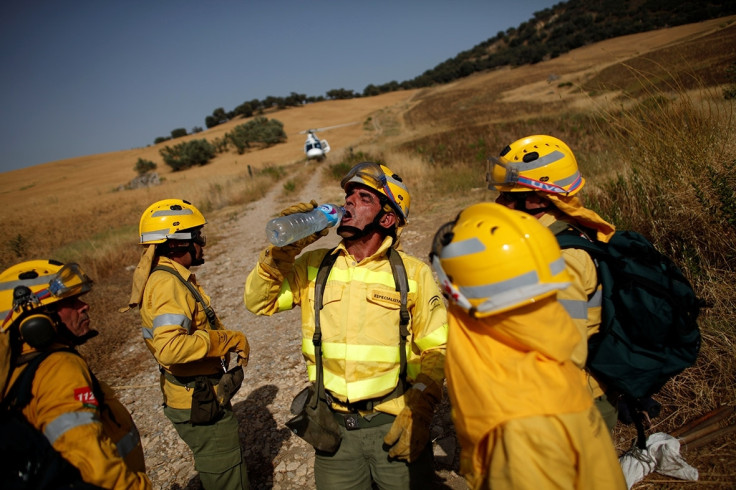Climate change is already damaging the health of millions around the globe
The impacts are disproportionately felt by vulnerable communities in low and middle income countries.

Climate change is already damaging the health of millions of people around the world, with the outlook only set to worsen if action is not taken. That's according to a new report produced by an international collaboration of 26 leading organisations.
While the health of all populations will be affected, the impact is disproportionately felt by vulnerable communities in low- and middle-income countries, which are the least responsible for global emissions.
The report – The Lancet Countdown: Tracking Progress on Health and Climate Change – suggests the impact of anthropogenic climate change on public health is and will continue to be wide-ranging.
For example, increasing temperatures can exacerbate existing health problems in populations and introduce new health threats, including cardiovascular disease and chronic kidney disease.
Higher temperatures can pose profound threats to occupational health and labour productivity, especially for those who undertake manual, outdoor labour. In 2016 this effectively took more than 920,000 people globally out of the workforce, with 418,000 of them in India alone, the report says. This has important implications for the livelihoods of individuals, families, and communities, especially those relying on subsistence farming.
In addition, the number of people exposed to potentially fatal heatwaves has increased to a record 175 million in 2015. The health impacts of extreme heat range from direct heat stress and heat stroke, to exacerbation of pre-existing heart failure, and even an increased incidence of acute kidney injury from dehydration in vulnerable populations. Elderly people, children younger than 12 months, and people with chronic cardiovascular and renal disease are particularly sensitive to these changes.
There has been a 46% increase in weather-related disasters since 2000, affecting 4.8 billion people and killing more than 500,000. While not all deadly weather events can be directly attributed to climate change, the consensus is that their frequency will only increase as global warming worsens.
Undernutrition is also set to rise as climate change causes a 6% decline in global wheat yields and a 10% fall in rice yields for every 1 °C rise in global temperatures, the report predicts.
Meanwhile, global exposure to air pollution has increased by 11.2% since 1990, while 87% of world cities sampled breached WHO guidelines, meaning billions are breathing in unsafe air. It is estimated that ambient air pollution causes an estimated 3 million deaths a year.
Lastly, the report suggests that more than one billion people may need to migrate to more hospitable regions within the next 90 years due to rising sea levels unless necessary action is taken.
Leading doctors, academics and policymakers from institutions, such as the World Bank, the World Health Organization, University College London and Tsinghua University contributed to the report.
"The Lancet Countdown's report lays bare the impact that climate change is having on our health today," said Christiana Figueres, Chair of the Lancet Countdown's High-Level Advisory Board. "It also shows that tackling climate change directly, unequivocally and immediately improves global health. It's as simple as that."
"Most countries did not embrace these opportunities when they developed their climate plans for the Paris Agreement. We must do better. When a doctor tells us we need to take better care of our health we pay attention and it's important that governments do the same."
Hugh Montgomery, Co-Chair of the Lancet Countdown and Director of the Institute for Human Health and Performance at University College London, adds: "We are only just beginning to feel the impacts of climate change. Any small amount of resilience we may take for granted today will be stretched to breaking point sooner than we may imagine."
"We cannot simply adapt our way out of this, but need to treat both the cause and the symptoms of climate change. There are many ways to do both that make better use of overstretched healthcare budgets and improve lives in the process."
While the scale of the challenge that humanity faces is significant, the report highlights reasons to be optimistic. For example, the momentum behind efforts to cut emissions across a wide variety of sectors. Notably, numerous governments have committed to phasing out coal use, while renewable energy technologies and electric vehicles are on the rise.
The authors also say that the necessary response to climate change actually provides a chance to make substantial gains in public health, with potential benefits and opportunities including cleaning up the air of polluted cities, delivering more nutritious diets, ensuring energy, food and water security, and alleviating poverty, as well as social and economic inequalities.
"Climate change is happening and it's a health issue today for millions worldwide," said Anthony Costello, Co-Chair of the Lancet Countdown and a Director at the World Health Organization. "The outlook is challenging, but we still have an opportunity to turn a looming medical emergency into the most significant advance for public health this century."
"As we move in the right direction, we hope for a step-change from governments to tackle the cause and impacts of climate change. We need urgent action to cut greenhouse gas emissions. The health and economic benefits on offer are huge. The cost of inaction will be counted in preventable loss of life, on a large scale."
The 2015 Lancet Commission on Health and Climate Change concluded that anthropogenic climate change threatened to derail 50 years of gains in public health. The latest research builds on this work, suggesting that the challenges are greater than anticipated.





















